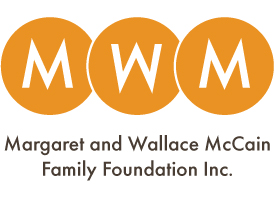Smart Start is a comprehensive program that offers a continuum of services to children, parents and families. At the core are Smart Start Early Years Centres that offer early learning and child care to preschool children and a continuum of services to their families.
Smart Start began as a preschool program five years ago located in Prince Street School and modelled after Toronto First Duty. A partnership with the Margaret and Wallace McCain Family Foundation (MWMFF) in 2009 expanded Smart Start into a full-time preschool and infant program, aligned with the school system.
In 2010, the PEI government introduced full day kindergarten and Early Years Centres across the province, including four Smart Start locations. Today, Smart Start brings together Best Start (home visiting from birth), family resource programs, drop in play groups, infant, preschool, and school-age child care, early intervention services and parenting resources with consistent high quality early childhood education programs at the core.
The Health and Education Research Group (HERG) from the University of New Brunswick has conducted an evaluation of Smart Start in the form of an extensive case study from the Fall of 2009 to June 2011.1
The Smart Start case study evaluates how Smart Start has evolved as an integrated program platform incorporating Early Years Centres aligned with schools at the centre. It describes program scope and operations, utilization, and the impact on children, families, educators and public policy. Data sources include key informant interviews, focus groups, survey results, monthly reports, field notes and document review.
The findings point to benefits for children, families and educators.
1. Children benefit
Parent, kindergarten teacher and early childhood educators report benefits for children, including enhanced social-emotional development and early learning skills. The Early Years Evaluation Teacher Assessment of children presents further evidence of positive child impacts. A fall 2010 and spring 2011 assessment revealed significant growth in children’s skills with the greatest gains in cognitive development. The outcomes were analyzed taking into account ‘maturity effect’ – the gains were more than would be anticipated due to growing older.
2. Parents benefit
Parents report strong satisfaction with Smart Start, including ready access to extra parenting advice and tools. About 50 percent report increased comfort in entering formal schooling and more involvement in their children’s early learning due to their participation in Smart Start. Almost half of the families who report taking part in the Smart Start Early Years Centres also take part in other Smart Start programs.
3. Increased access
The expansion of the infant centre and the preschool Early Years Centres has increased access to programs for many families. Utilization at Smart Start Prince Street increased by 67% in 2010/2011. Because of the flexible attendance options, many families can access programs on a part-time basis. Participants identified the responsiveness and flexibility of Smart Start programming as one of the most important benefits.
4. Maximize resources
The administrative infrastructure that CHANCES has created over the years has allowed the evolution and expansion of Smart Start with minimal start-up and added administration costs. The sharing of expertise of professionals allows timely and sensitive support to families without additional costs. In spite of the inevitable challenges that accompany systemic change, the transformation of child care funding to Early Years Centres has been accommodated while Smart Start expanded.
5. Increased practices of integration
Educators working with children and families are blending family-centred practice with early childhood curriculum and pedagogy. Early identification of developmental problems can be addressed in a timely manner because early intervention professionals are part of the staff team. Families are able to access parenting supports without registering for a new class or appointment. Children’s progress is documented and carries forward, including into kindergarten and the school system.
6. Opportunities to expand the Smart Start model
Smart Start is an early leader in Prince Edward Island, demonstrating what is possible in fulfilling the provincial vision of early learning for all children, support to all families and alignment to the education system. Two outstanding goals remain:
- Expanding access to all children from age two, including those who are identified by Best Start but are unable to participate in Early Years Centres because parents cannot afford the cost and do not meet current eligibility criteria.
- Continued development of family-centred practise and delivery of early childhood education curriculum and pedagogy that incorporates the new provincial curriculum framework.
Smart Start Phase 2
The second phase of Smart Start includes a range of enhanced services for children and families transitioning from the Best Start Program and increased access to preschool programs in the Early Years Centres. The government announced funding to increase Best Start programming from age two to age three. MWMFF is announcing a four year initiative that will ensure children and families transitioning from Best Start who can benefit from additional support have access to a range of services that may include attending a preschool program in a CHANCES Early Years Centre and access to parenting resources and tools. Smart Start educators will participate in a planned professional learning agenda that will focus on the planning, implementation and evaluation of an early childhood education curriculum and family practice skills.
The first phase of Smart Start complemented the provincial government’s vision for an early learning system in PEI and has informed its initial implementation. The second phase hopes to demonstrate how to carry out the rest of the vision and make quality early childhood education available to all children and their families. A careful cost effectiveness study will document the financial implications and report on the financial viability of a universal platform versus the costs of specialized, targeted programs that do not reach all families.
MWMFF has invested $450,000 in Smart Start Phase 1 development and start-up. Those areas of programming are now financially sustainable. The Foundation now commits over $600,000 over four years to Smart Start Phase 2.
